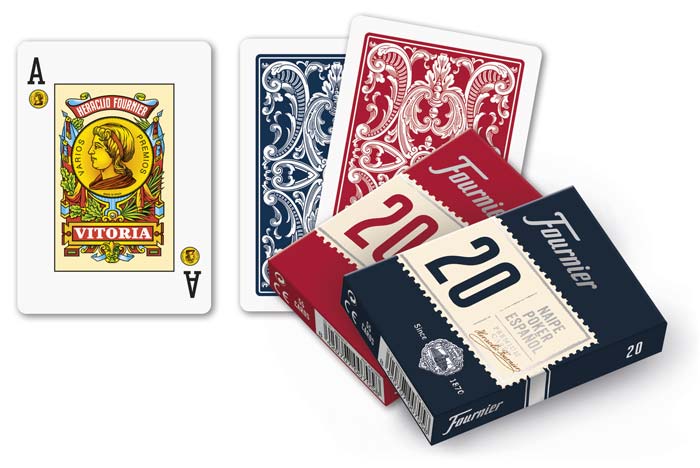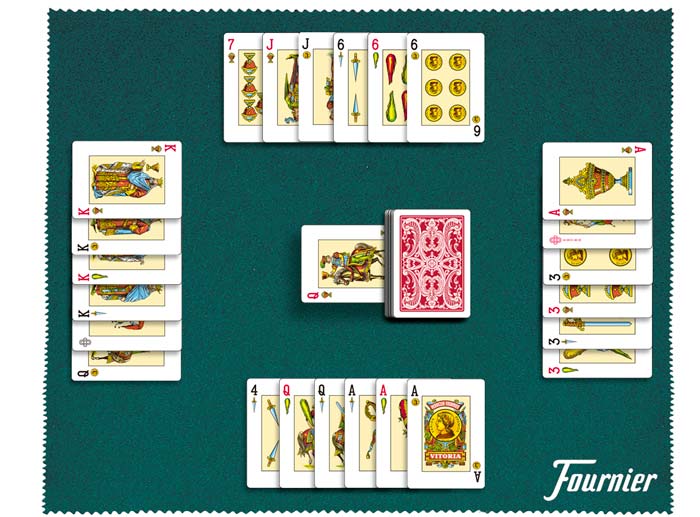Continental is a game like Gin Rummy, Remigio or Canasta, where the aim is to combine cards. It has two characteristics that make it different: melds that have to be made after each deal are fixed and players are allowed to take other players’ discard out of turn, drawing an extra “penalty” card from the stock deck.
Meld the cards in the established combinations and show them, with the cards that the player holds in their hand, melded or not, scoring. The one with the least number of points at the end of the match wins.
Continental is played using several 52 card Spanish poker decks, although English poker decks with the same number of cards are also admitted. The two wild cards (Jokers) per deck are also needed. For four players, the game starts with two decks and finishes with three. From five to eight players, it is best to start with two decks, add one after the first two partial games and another after the next two.
From two to eight players, always played individually without forming pairs or teams.
The order of the cards, as usual, is from ace to king consecutively.
The value of the cards is as follows:
| Wild card | 50 Points |
| Ace | 20 Points |
| K, Q, J, 10, 9 y 8 | 10 Points |
| 7, 6, 5, 4, 3 y 2 | 5 Points |
Players draw cards to see who will be the first to deal. The cards are shuffled and the cut, then each player is dealt six cards, one at a time, in an anticlockwise direction. The rest of the deck is then divided into two stacks, placed in the centre of the table. The stock deck usually contains more cards than the penalty deck. The top card of the stock deck is taken and placed face up to start the discard pile.
During their turn, each player can take the top card from the discard pile or the top card off the stock deck. At the end of their turn they put down one of their cards on the discard pile. If the player does not take a card from the discard pile, any following player can take it during their turn, drawing another card from the “penalty” deck.
During their turn, the player who has melds that correspond to the game in progress can show them, although they do not finish due to having taken extra punishment cards, and keeping the remaining cards, combined or not.
The advantages of a player showing their melded cards are:
On the other hand, placing the cards down has the disadvantage of making it easier for other players to finish.
When someone finishes, each player proceeds to note down the value of the cards they still hold. The cards are then gathered up and the turn to be dealer passes to the next player, who deals out the corresponding cards, and so on. When the last hand is played, the player with the fewest accumulated points wins the match.
Players can make the two following melds in each hand:
The wild card or Joker can be used to replace any other card in the deck. A trio can be made using two wild cards plus one natural one, but not by using three wild cards.
The maximum number of cards in a trio is determined by the number of decks in play (four cards per deck plus two wild cards). In a run, the maximum number is thirteen (all the cards of a suit), however, some of these can be substituted by wild cards. The run can start and finish with any card, with the ace being placed between the king and the deuce.
In Continental, the melds that players have to make are fixed and the order in which they have to be played is as follows:
If players wish to extend the game (usually if only three or four players participate), the number of cards dealt can be increased to sixteen, proceeding in following with the indicated scale.
In Continental, any player can pick up a card discarded by another if none of the previous players have picked it up. If the player takes the discard during their turn, play continues as normal. If it is picked up out of turn, then they have to take another card from the “penalty” deck. Due to this double draw, the player can be left holding cards in their hand after melding.
Any player who chooses to pick up their own discard, if none of the other players have taken it, must take another card from “penalty” deck.
When a player matches all of their cards and ends the hand, the other players must note down the value of the cards they are still holding, even if they form part of a combination.
If you wish to receive the latest news from Fournier in your email
Sign up!
Are you a distributor, collector, card fan, professional player? At Fournier we have the best exclusive information from within the sector, personalized to suit your interests.
Sign up!
